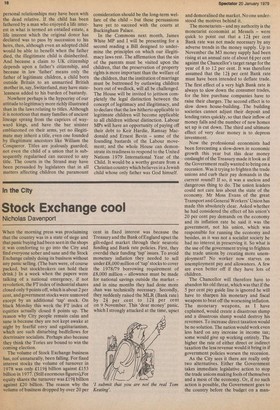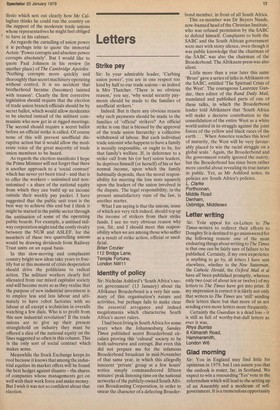In the City
Stock Exchange cool
Nicholas Davenport
When the morning press was proclaiming that the country was in a state of siege and that panic buying had been seen in the shops it was comforting to go into the City and find everyone sober and sane and the Stock Exchange calmly doing its business without any panic selling. (The bars were, of course packed, but stockbrokers can hold their drink.) In a week when the papers were talking of a national emergency, if not revolution, the F1' index of industrial shares closed only 9 points off, which is about 2 per cent, and government stocks were unmoved except by an additional 'tap' stock. On black Monday this week the FT index of equities actually closed 8 points up. The reason why City people remain calm and sane is because they are not kept awake at night by fearfill envy and egalitarianism, which are such disturbing bedfellows for doctrinaire socialists. Perhaps also because they think the Tories are bound to win the coming election.
The volume of Stock Exchange business has, no unnaturally, been falling. For fixed interest stocks the volume of turnover in 1978 was only £1194 billion against £153 billion in 1977. (Still enormous figures).For equity shares the turnover was £194 billion against £20 billion. The reason why the volume of business dropped by over 20 per cent in fixed interest was because the Treasury and the Bank of England upset the gilt-edged market through their neurotic funding and Bank rate policies. First, they overdid their funding 'tap' issues. To avoid monetary inflation they needed to sell under £8,000 million of 'tap' stocks to cover the 1978/79 borrowing requirement of £8,000 million — allowance must be made for national savings outside the market — and in nine months they had done more than was technically necessary. Secondly, they suddenly raised the MLR (Bank rate) by 24 per cent to 124 per cent on 9 November. This 'dear money' panic. which I strongly attacked at the time, upset and demoralised the market. No one understood the motives behind it.
The monetarists— and my authority is the monetarist economist at Messels — were quick to point out that a 124 per cent Bank rate was not made necessary by any adverse trends in the money supply. Up to November the M3 money supply had been rising at an annual rate of about 64 per cent against the Chancellor's target range for the year of 8 to 12 per cent. It was therefore assumed that the 124 per cent Bank rate must have been intended to deflate trade. The first effect of a very high Bank rate is always to slow down the consumer trades, for the hire purchase companies have to raise their charges. The second effect is to slow down house-building. The building societies cannot adjust their deposit and lending rates quickly, so that their inflow of money falls and the number of new homes set up is cut down. The third and ultimate effect of very dear money is to depress investment.
Now the professional economists had been forecasting a slow-down in economic growth this year but this dear money onslaught of the Treasury made it look as if the Government really wanted to bring on a recession. Was it trying to frighten the trade unions and curb their pay demands in the current round? If so, it was a useless and dangerous thing to do. The union leaders could not care less about the state of the economy. Mr Moss Evans of the great Transport and General Workers' Union has made this absolutely clear. Asked whether he had considered the effect of his union's 20 per cent pay demands on the economy and its inflation rate he said it was the government, not his union, which was responsible for running the economy and besides, as it was not a socialist society he had no interest in preserving it. So what is the use of the government trying to frighten the trade unions by creating more unemployment? No worker now starves on unemployment pay and allowances. A few are even better off if they have lots of children.
The Chancellor will therefore have to abandon his old threat, which was that if the 5 per cent pay guide line is ignored he will have to sharpen his monetary and fiscal weapons to beat off the worsening inflation. The monetary weapons, as I have explained, would create a disastrous slump and a disastrous slump would destroy his revenues. To increase direct taxation would be no solution. The nation would work even less hard on any increase in income tax; some would give up working entirely. The higher the rate of either direct or indirect taxation the less revenue would it bring in if government policies worsen the recession.
As the City sees it there are really only two alternatives. Either the Government takes immediate legislative action to stop the trade unions making fools of themselves and a mess of the economy. Or, if no such action is possible, the Government goes to the country before the budget on a man ifesto which sets out clearly how Mr Callaghan thinks he could run the country on the support of the moderate trade unions whose representatives he might feel obliged to have in his cabinet.
As regards the curtailing of union power it is perhaps trite to quote the immortal Acton: 'Power corrupts and absolute power corrupts absolutely'. But I would like to quote Paul Johnson in his review (in another place) of The Cambridge Apc4tles: 'Nothing corrupts more quickly and thoroughly than secret machinery operating without control. It is no accident that brotherhood became (becomes) tainted with treason'. Clearly the first corrective legislation should require that the election of trade union branch officials should be by secret ballot, which would allow moderates to be elected instead of the militant communists who now get in at rigged meetings. The second should require a secret ballot before an official strike is called. Of course none of this will prevent unofficial disruptive action but it would allow the moderate voice of the great majority of trade union members to be heard.
As regards the election manifesto I hope the Prime Minister will not forget that there is another approach to a 'social contract' which has never yet been tried — and that is to offer the workers — unionised and nonunionised — a share of the national equity from which they can build up an income outside their weekly pay packet. I have suggested that the public unit trust is the best way to achieve this end but I think it might be started in the public sector through the unitisation of some of the operating public boards. For example, a unitised railway corporation might end the costly rivalry between the NUR and ASLEF, for the members of these two quarrelling unions would be drawing dividends from Railway Trust units on an equal basis.
In this slow-moving and complacent country bright new ideas take years to fructify but at this moment of crisis desperation should drive the politicians to radical action. The militant workers clearly feel alienated from our mixed capitalist society and will become more so as they realise that the purpose of new industrial investment is to employ less and less labour and ultimately to have robot factories with no labour at all except a technician in overalls watching a few dials. Who is to profit from this new industrial revolution? If the trade unions are to give up their present stranglehold on industry they must be offered a slice of the national equity on the lines suggested so often in this column. This is the only sort of social contract which makes sense.
Meanwhile the Stock Exchange keeps its cool because it knows that among the industrial equities its market offers will be found the best hedges against disaster — the shares of companies whose managements get on well with their work force and make money. But I wish it was not so confident about that election.



































 Previous page
Previous page